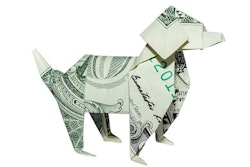
South Korea’s Ministry of Agriculture, Food and Rural Affairs is working on a new five-year plan that should see its country adopting tougher regulations to improve animal welfare and pet ownership, possibly boosting the local pet food market.
South Korea is one of the trendiest tourist destinations in the world but is infamous for its dog meat farms. Young South Koreans, however, see pets as cherished companions and have no desire to eat them.
Growing pet ownership, pet food consumption
The ministry is expected to enhance public awareness on animal welfare and on improving living conditions for pets, livestock and laboratory animals. The new regulations also aim to serve as a blueprint on how pets’ rights must be protected, seeing that more than a quarter of South Korean households had a pet as of 2019, according to the ministry.
Instead of being eaten themselves, dogs’ and other pets’ consumption of pet food can now freely contribute to the country’s growing market. A sector trend analysis report by the Canadian government puts South Korea’s pet population at 7.5 million in 2018. which ate up US$864.9 million worth of pet food. By 2023, the country’s pet food market value will be US$1,168.9 million, the report said.
The ministry, on the other hand, expects South Korea’s market for pets and related business to reach 3.4 trillion won (US$2.95 billion) in 2020 and to expand to 5.7 trillion won (US$4.8 billion) by 2026.
Pro-animal regulations on the docket
The new set of legal protections will start to roll out this year and should be well in place by 2022 to carry out the following:
- A mandatory course on animal rights prior to pet adoption.
- Teaching on the subject of animal rights in schools. (Starting in March 2020, dissecting animals during science class will only be allowed if schools meet certain criteria.)
- An insurance program for owners of certain breeds of dogs such as Tosa, American Pit Bull Terrier, American Staffordshire Terrier, Staffordshire Bull Terrier, Rottweiler and related mixed breeds.
- Maximum three-year imprisonment for any mistreatment leading to the death of an animal.
- A ban on dogs that are kept on a short leash at home and are confined in dimly lit rooms.
The ministry will also set guidelines on adequate living space for farm animals and the rights of animals used in public events. Instead of just paying fines, those who cruelly experiment on animals may also now face up to two years in jail.














